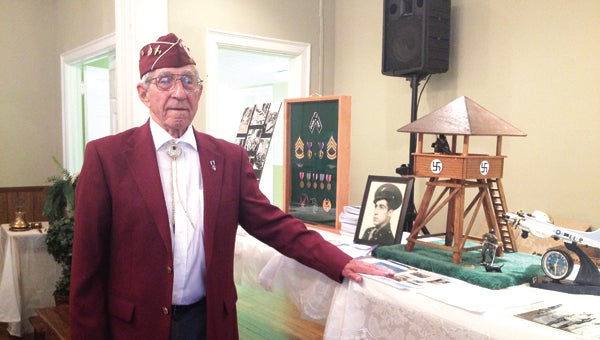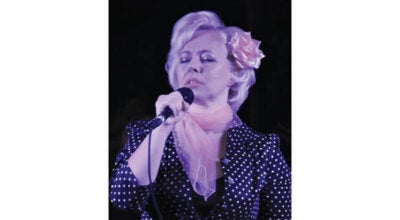From radio operator to prisoner of war, Erwin resident shares epic WWII experience
Published 8:51 am Saturday, May 23, 2015

Star Photo/Lynn Richardson
World War II veteran George Hatcher shares his story and memorabilia with the Elizabethton Rotary Club on Wednesday.
Ninety-four year old George Hatcher, Jr. of Erwin stood before the Elizabethton Rotary Club on Wednesday and told of a war long ago and far away. The room was completely silent as he described the horrors of battle, the agony of capture and captivity and finally, the joy of freedom.
The decorated WWII veteran began his story of his experiences of war and of his time as a German prisoner of war by telling the group that he is an Army Air Force veteran and a teetotaller who gets regular exercise and reads the Bible every day.
“Now, let me tell you what I’m not,” he continued. “I am no hero. I’ve never done anything that I can brag about. I’m only one of 17 million of those who joined and fought — (and his voice broke)— in World War II. We took on two of the greatest armies ever assembled, Japan and Germany. But I ask for neither sympathy or praise.”
Hatcher was on duty as a radio operator assigned to the 457th Bomb Group, 749th Bomb Squadron of the “Mighty Eighth” Air Force when he got the news that Pearl Harbor had been attacked. Not long after that, early on May 27, 1944, he was awakened and informed he was being sent on a bombing mission — his fourth.
“I remember having a hearty breakfast that morning,” he said. “Eggs, toast, coffee, bacon and gravy. I remember it well because it was my last ‘sit-down’ meal in over a year.
He and his company boarded a plane and flew across the English Channel toward German-occupied France. “Three B-17s went down really close to us,” he said. “I tried to count the parachutes, hoping there would be ten. But there were only eight; two didn’t make it.”
Both the navigator and the co-pilot of his plane were hit and seriously wounded. The plane had also sustained extensive damage; only two engines remained and all the metal on the right wing had been torn away. The gasoline tanks were on fire.
“I knew I needed to jump, but I had a job to do,” Hatcher said. “I had to destroy the radio first.”
That task completed, Hatcher fastened on his parachute and headed to the fuselage.
“I had never bailed out before,” he said. “And there were two other gunners standing back there, looking out through the flames without jumping. I bumped them a little bit, but they didn’t budge. So I just backed up and took a run and tackled them and all three of us went out into the sky.
“As we fell, I looked at my watch,” Hatcher said. “It was 1:30 in the afternoon. We had been in combat for 7½ hours.”
Hatcher remembers his fall in great detail.
“When I bailed out, it was deathly quiet,” he said. “I closed my eyes and said a prayer. I was just thankful to be alive.”
The ground “came up faster than expected” and after his landing, more danger was close at hand. He heard voices behind him, speaking a language he didn’t understand. Soon after, he heard a gun mechanism, something he understood all too well.
Guns pointed, three Germans captured Hatcher and took all of his belongings, except for his high school ring which he managed to hide from them. They took him into a nearby town where other U.S. soldiers were being held prisoner.
“Eventually they took us and put us in a dark dungeon, about six by eight,” Hatcher said. “There was only a bench, a bucket, a little water and two pieces of black bread.”
In the grim cell, Hatcher thought of his mother and his 10 brothers and sisters back home.
“I didn’t know how long the war would last and I knew my mother would get a telegram telling her I was missing in action,” he said. “I knew she would be so worried.”
All he could think of was a song that she used to sing — “Tramp! Tramp! Tramp! (The Prisoner’s Hope) — a song written in 1864. Hatcher still remembers all the words and recited the lyrics:
In the prison cell I sit,
Thinking Mother dear, of you,
And our bright and happy home so far away,
And the tears they fill my eyes
Spite of all that I can do,
Tho’ I try to cheer my comrades and be gay.
Tramp, tramp, tramp, the boys are marching,
Cheer up comrades they will come,
And beneath the starry flag
We shall breathe the air again,
Of the freeland in our own beloved home
Hatcher can’t determine just how long he was in the dungeon. But he was finally moved out and taken to some Catholic nuns who gave him some clothes, a cardboard suitcase and some cigarettes. It was the first time he had his clothes off since his capture.
Then he was moved to another prison camp.
“There, I was put with 25 other men in a small room that was part of a compound,” he said. “There were rough lumber beds and I used my shoes as a pillow so no one would take them.
“The first morning, they brought a bucket of green soup, neither hot nor cold, a cup for each of us, and one loaf of bread for all 26 men to share. I ate it (the soup) and tried not to look at it, hoping lunch or dinner would be better. But it wasn’t because there was no lunch or dinner. We got the same soup every day, once a day.”
The prisoners were allowed to walk around outside at the compound and Hatcher remembers seeing a cloud of dust in the distance one day. Another group of U.S. prisoners, being led into captivity, was stirring up the dirt.
“They were chained together, forced to run, beaten with clubs and the German soldiers were sicking the dogs on them,” Hatcher said. The men cringed and jumped as their captors led them toward their imprisonment. Two of those men were members of what Hatcher calls “The Erwin Nine” — a group from his hometown of Erwin who were all POWs in the same prison camp, Stalag Luft No. 4.
Finally Christmas came, Hatcher said, and the weather turned bitterly cold. The prisoners sang carols and remembered happier times.
“It was a Christmas that I’ll never forget,” he said. “I had taken so much for granted and I promised myself I’d never do that again.”
Hatcher continued to have hope, even after he and others were moved to yet a different camp, Stalag Luft #13-B at Nuremberg. After almost six weeks there, they were told to pack up and get ready to evacuate. He heard bombs dropping and “big guns off in the distance.” Then he learned that General George Patton’s army had broken across the Rhine River and was heading their way.
They were moved once again, this time to Stalag Lluft #7-A at Mooseburg. After about four or five days there, Hatcher realized he didn’t hear the guns anymore. It had grown very quiet.
“Then I glanced down the road and saw American tanks coming,” he said. Hatcher later learned that 127,000 Allied prisoners of war were liberated that day.
Several weeks later, he was on a ship, bound for the United States and home – a place he hadn’t seen in over 19 months.
“We pulled into New York harbor at night,” Hatcher said. “I could see the city lights from the ship, and I couldn’t sleep, so I walked the deck all night. At daylight, I looked out and I saw the Empire State Building, untouched by the war. The sun was shining and I looked over and saw the Statue of Liberty,” Hatcher said.
“I knew the meaning of liberty and my eyes filled up with tears,” he said. “God bless the U.S.A.”




